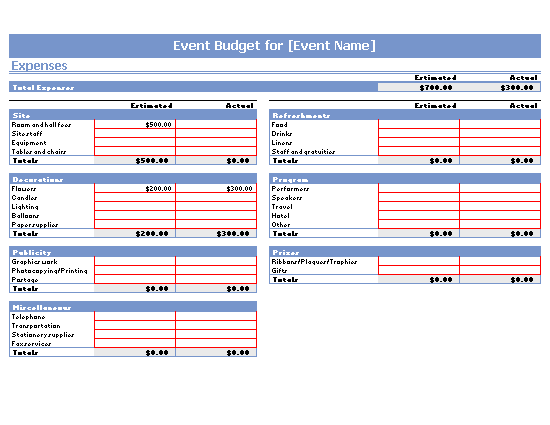
Planning an event can be exciting and stressful, often at the same time. Whether you're organising an intimate product launch or a large corporate gala, staying within budget is the key to increasing profits and reducing stress levels.
Event budgeting involves making a forecast of the expenditure and income that is likely to be generated over the course of an event, and adjusting these estimates in relation to actual costs. While it's important to prepare an accurate budget as early as possible, it's equally important to review and update this budget throughout the process. An event budget involves predicting the financial outcome of an event in order to improve event management practices and ascertain financial viability.

Why does it matter?
Regardless of the type of event you're involved with, having an accurate working budget is critical. Solid budgeting practices will allow you to reduce unnecessary expenses, enhance income streams, eliminate redundancies, and improve management practices. Without a budget, it's all too easy for costs to spiral out of control and profits to be left on the table.
In order to exercise complete control over your event, you need to make sound financial decisions every step along the way. A solid plan is necessary for anyone who wants to keep their eye on the bigger picture without getting lost in the fine print. A clever event budget is both organised and flexible, with the entire project set down from the outset and continual refinements made where necessary.
How do I create an event budget?
Preparing a budget involves identifying and costing all probable sources of income and expenditure. From venue hire and event marketing through to the food and the sound system, all possible expenses need to be listed, categorised, and tracked. From ticketing and sponsorship through to merchandising sales and participation fees, all possible sources of income also need to be identified.
While some form of predictive capacity is needed to create an event budget, this process is about experience and expertise more than simple guesswork. Excel and other spreadsheet programs can be helpful when creating a budget, with software tools allowing for numerous adjustments and refinements throughout the project life-cycle.

A number of templates can be used to create an event budget, with one robust method using the following iterative approach:
- Budget item
- Projected expense or income
- Actual expense or income
- Difference between projected and actual costs
- Details about discrepancies
- Repeat
More specialised event budgets will categorise individual items according to their class, monitor timelines, and track discrepancies between projected and actual costs. For example, all marketing expenses can be listed adjacent to one another, and all income sources related to ticketing can be managed in a similar fashion.
While a well-managed event budget can take a little time to set up, it will help to save you more time, money, and headaches than you could possibly imagine. This basic template is repeated in much more detail at the end of this guide.

Top Ten Money Saving Ideas for Your Event
1. Start early
Like most things in life, the early bird catches the worm. It's no use taking the time setting up an event budget if you've already overspent on key items - you need to get in first. An early-start, top-down approach is always best, as long as you remember to be flexible and make adjustments where needed. Borrowing templates and figures from past events can be a great way to establish a baseline, especially if you've managed similar events in the same event space.
While your first budget draft doesn't need to be rich on details, it should be architecturally intact and include room for all possible scenarios. By starting early, not only are you setting up good habits for the remainder of the process, you're also providing a sense of confidence to your clients, boss, or anyone else who's entrusted you with an event.
Key benefits:
- Getting an early start will allow you to lock in contractors and access more competitive quotes.
- Lots of businesses offer early bird discounts to people who make a booking months or years ahead of the event date.
- Starting your budget early will also allow you to get more quotes, make more detailed plans, and leverage online marketing and online event ticketing channels.
2. Get organised with templates
Even the very best event managers are likely to fail without a plan. Whether it's a rough notepad or a highly detailed Excel spreadsheet, templates allow you to turn abstract ideas into concrete structures. Access to the right template will help you to visualise your ideas, structure your plans, and improve your memory. Excel spreadsheets and similar software tools offer users far more flexibility than hard copy budgets, because they can adapt to your event over time as changes are made.
You can build your own event budget template from scratch in whichever format you prefer, with specialised events often needing to borrow ideas and structures from existing templates. For example, if the template you're using for a corporate event is almost perfect but has no entry for sponsorship income, you can easily add this feature from another template.

Helpful tools: Along with spreadsheets, you may want to access other digital tools such as dedicated online marketing programs, specialised accounting and budgeting software, event ticketing systems, and other event management resources.
3. Review and update often
The perfect event budget relies on structure and flexibility. While it's important to start early and construct a detailed plan from the outset, your budget should always be ready to adapt. It's simply not possible to know all of the costs or income details from the outset.
A clever budget needs to be flexible so that it can be refined as soon as new information becomes available. That way, each new decision you make is based on accurate and up-to-date data. Whether it's an altered quote, a different delivery date, or updated ticketing changes, changes in the real world need to be reflected in your budget as soon as possible.
Budgeting for an event is all about forecasting, predicting, sometimes even taking educated guesses. This is where budget reviews and exercises come into play. By reviewing and analysing your existing budget throughout the process, you can identify any leaks or pressure points well before the event starts.
Questions to ask yourself:
- Are your estimates conservative enough?
- Have you accounted for the worse case scenario?
- Are your margins realistic?
- Is your financial plan robust enough to cope with major changes?
4. Be conservative
From selecting venues and decor through to menus and music, planning an event requires creativity. In order to meet your creative goals, however, you need to be conservative when it comes to your budget.
Instead of trying to make a huge profit, you should always start by trying to avoid making a loss. Once the basics are covered, you can start trimming expenses and adding revenue streams to transform a neutral event into a profitable one.
If things start to go awry due to unforeseen circumstances, it's often better to change the scale or style of the event rather than incur a huge financial loss. Every single expenditure estimate that you make should be conservative. For example, if you've got two quotes for catering, adjust your costing’s for the more expensive quote even if you don't plan on using it. That way you're covered if the first option falls through at the last minute.
Even when you're sure about a supplier, it often makes sense to add a few hundred or thousand dollars to the estimate depending on the size of the event. It's especially important to be conservative about potential incomes such as sponsorship, online event ticketing, participant fees, or fund-raising achievements. Incomes are harder to pin down than expenses, so try not to rely on money you may not be getting when crunch day comes around.

5. Get multiple quotes
When you're organising an event, it's always important to keep your options open. Research is a valuable negotiation tool, and in this day and age of the Internet, it's easier than ever before. Regardless of the service you're considering, you should always get a minimum of three quotes before signing a contract or parting with your money. It's amazing how widely quotes can differ for the same service, so always remember to compare as many options as possible.
While price is the most significant factor in many cases, it's also important to read the fine print and compare quotes based on the level of services available. The cheapest option is not always the best, so take your time, and find the perfect provider for your event. Even if you've got an existing relationship with a vendor, or you've made the decision to use a particular provider, you may be able to use alternative quotes as a bargaining tool for price matching purposes. Having multiple quotes can prove useful throughout the negotiation process, so always keep an accurate record for future reference.
There's more to negotiation than simply comparing quotes; however, you should also be able to bargain with vendors to help them drop prices or throw in additional services. You may be surprised how many added options businesses are ready to include in order to secure a big deal, something you'll never know if you don't ask.
Typical event expenditure includes:
- venue hire
- decor
- travel and accommodation
- insurance
- catering
- gifting and activity expenses
- postage and telephone
- printing and stationery
- equipment hire
- transportation
- marketing
- event ticketing systems
- staff wages

6. Plan for the unexpected
No, it's not always OK on the night. Sometimes, everything goes wrong at the same time and you're left trying to explain the hopeless situation you're in to guests or clients. When organising an event, it's always important to plan for the unexpected. One way to do this is by having a second or third option for every item in your budget. Who do you call when the sound system cancels at the last minute? What do you do when the venue becomes unavailable a week before the event?
7. Set up a contingency reserve fund
While planning for the unexpected is not all about money, setting up a contingency reserve fund is one of the best security blankets you can have. Depending on the size and complexity of the event, you may want to allocate as much as 25 percent of the entire event budget to this emergency pool. Having some leeway with your budget should give you enough breathing room to absorb unexpected costs and get on with the show.
This is especially important if your event is outdoors, where unexpected weather conditions can add on costs and create additional headaches at the last minute. While having a contingency fund for the entire project is often the most conservative choice, you may wish to create an alternative contingency section in your budget for each individual event item.
8. Diversify your income
Running a financially successful event is not just about reducing expenses; it's also about generating revenue. While making money is not the end goal of every event, income streams are an important way to offset expenditure and ensure the validity of your event going forward. Whether it's sponsorship, government grants, or merchandising, it's always important to diversify your income streams and find additional sources of revenue away from ticketing.
Don't limit your options by only offering one type of sponsorship, create tiered and personalised sponsorship packages that really engage businesses. Don't rely on print marketing alone to generate online ticket sales, use online marketing channels to target your audience. Another great way to diversify your income is to piggyback on other events. Maybe you can share a sponsorship deal? Perhaps you can purchase merchandising material in bulk to save costs?
Possible income sources include:
- government grants
- commercial sponsorship
- merchandising sales
- participant fees
- raffles
- spectator fees
- event ticketing systems
Expert advice: Online ticketing is a great way to save time and increase your revenue, allowing you to invest your resources in other areas.
9. Use online marketing
Whether you're organising a slick corporate gathering or a family friendly charity event, the Internet has a huge role to play in modern event budgeting. From online marketing and promotions through to sales and online ticketing, the Internet allows you to target specific audience groups better than ever before.

Online marketing can be split into organic and commercial campaigns, with organic marketing using search engine optimisation (SEO) to drive traffic to a website, and commercial marketing using targeted ads on Google and other platforms. Depending on the size of your event and the time you have available, both options can be incredibly effective. Online marketing is a great way to create a buzz around your event, appeal to sponsors, and drive ticket sales through event ticketing systems.
10. Use online event ticketing
Online event ticketing platforms are a great way to streamline the marketing, sales, and ticketing process for any event. Gone are the days when you had to mail out individual paper tickets to every attendee. Not only was this time-consuming and expensive, it also had a greater capacity for error.
Online ticketing platforms allow this entire process to be automated, with marketing channels built-in, sales tracked, and tickets delivered electronically. This can save you time and money, with no need to continually check ticket sales manually and no need to cross-check tickets at the door.
Expert advice: When choosing an online event ticketing platform, it's important to pay attention to marketing integration, ticket options and tiers, list building strategies, and hard copy delivery.

Build Your Own Basic Event Budget Template
Creating your own event budget template is about solid organisation and ongoing refinement. By completing the following steps, you can ensure an accurate event budget that continually adjusts itself to meet your needs and expectations. Clever budgeting should always be approached in an iterative fashion, with the entire sequence repeated time and time again until the event takes place. It's not enough to simply list expenses and revenues; you need to analyse the differences between projected and actual costs and make adjustments where needed.
Budgeting is not an activity that is completed in a few hours. A good budget may be worked on for several weeks, if not months, adding and changing figures as new information comes to light. For this reason, budgeting is often referred to as an iterative process.
Step 1: List individual items
All good budgets start by listing and categorising individual budget items. The list will vary in size depending on the scale of your event, and vary dynamically depending on how close you are to event day. While you will know some of the details from the outset, items may need to be added or removed as the situation changes. Unless your event is very small, it normally makes sense to categorise each item in a logical manner, with the most basic split being that between expenses and income.
Step 2: Calculate projected expenses
Once you have listed each budget item, you need to separate the expenses and calculate the projected costs for each one. While there may be some guesswork involved here, you can improve the accuracy of your budget by using current quotes and past estimates from previous events. It's important to get multiple quotes for each item where applicable in order to come up with an accurate forecast. Once the actual costs are known and have been analysed, this step can be refined to the point where no guesswork is involved at all.
Step 3: Calculate projected incomes
Much like the last step, this stage of the process involves forecasting incomes based on past experience and expertise. Once again, this step can be improved by using income estimates from previous events. While you can never rely on event income with 100 percent accuracy, approaching this list in an iterative fashion will allow you to make increasingly accurate projections, as you get closer to event day.
Step 4: Set up a contingency reserve fund
Having an accessible reserve fund is always a good idea. Depending on the scale and type of event, you may wish to make a contingency reserve fund that covers the entire event or set up individual reserve funds for specific items that are more likely to go wrong. Depending on how exposed you are, this fund can be anywhere from 5 to 25 percent of the overall event budget.
Step 5: Compare projected expenses with incomes
Quite simply, this step involves adding up all of the projected revenues from your event and subtracting all of the projected expenses, including a conservative contingency reserve fund. If your event is found to be running at a loss, it's time to go back to the drawing board. If your event is revenue neutral, great, try to trim some fat and turn a good event into a great one. If your event is profitable, ask why. Have you missed anything? Can you make it even better?
Step 6: Calculate actual expenses
As you get closer to event day, invoices will start to come in and you will have a very real idea of where you're at. Make sure to be honest with yourself and keep accurate records that quantify the actual costs involved with each item on your budget list.
Step 7: Calculate actual incomes
If everything is going well, revenue streams will start to solidify, as you get closer to the event. While some incomes such as sponsorship and government grants should be well and truly locked down by now, other expenses such as merchandising and ticket sales may still be up in the air.
Step 8: Compare actual expenses with incomes
Quite simply, this step involves adding up all of the actual revenues from your event and subtracting all of the actual expenses. Similar to Step 5, only this time you are using actual costings instead of financial projections.
Step 9: Compare projected estimates with actual costs
By this time, you really can't hide from the truth. Because your original budget was based on projections alone, you won't know the real financial state of your event until you have compared your projections with the actual costs incurred. The differences between your forecasts and reality will tell you whether or not you need to make significant changes.
Step 10: List details and discrepancies and repeat
Once you have accurate working figures, you can list details about items that are nor performing as expected, analyse discrepancies, and repeat the entire process to see where you can make refinements. If you're way off the mark, you may need to alter or remove budget items, find cheaper quotes, or generate additional sources of income. This is the key to clever budgeting, with a tight feedback loop allowing you to identify and solve problems before they get out of control.
Even when your budget is on point, it's important to have an experienced team to help you optimise ticket sales. Event ticketing systems can help you to improve revenue and reduce expenses by selling more tickets and optimising sales channels. For more advice on ticketing strategies, speak to the team at Ticketebo.








